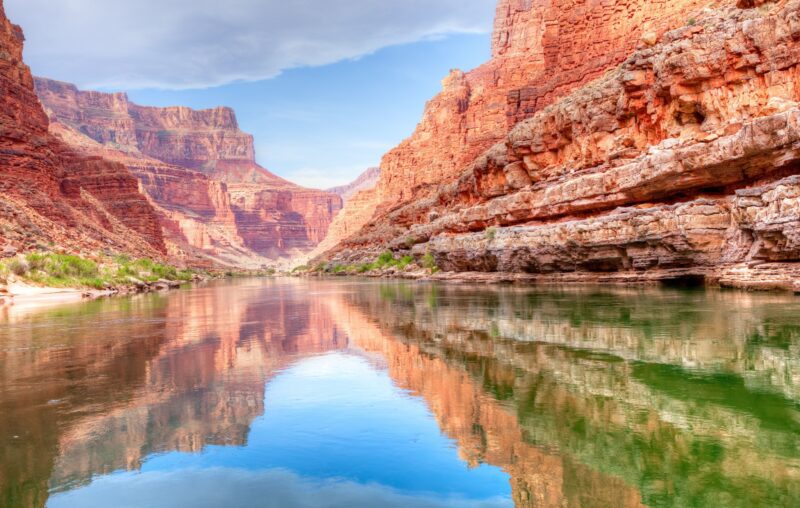[ad_1]

The Colorado River has been dealing with a water disaster for over 20 years. From 2000 to 2021, the river basin has “misplaced over 40 trillion liters of water.” Per a current information report, water shortage has led to disputes among the many seven states sourcing water from the Colorado River.
Whereas it’s heating up, the controversy is nothing new. For years, states have contested their water allotments. Commentators are fast to search for the reason for the plummeting water ranges, pointing to local weather change or inhabitants booms within the southwest. The true offender is much less apparent.
The offender of the shrinking Colorado River is agricultural subsidies. A staggering 79 p.c of the water harvested is for agricultural use; solely 12 p.c is for residential use. A mixture of crop, irrigation, and crop insurance coverage subsidies have shaped a “subsidy straw” dipping into the river itself. These farming-sector entitlements have incentivized producers to develop thirsty vegetation, underpriced water extraction, and created ethical hazard. To avoid wasting the Colorado River, it’s important to finish this water-guzzling trifecta.
Frequent sense declares we should always keep away from rising water-intensive crops within the desert. Crop subsidies permit farmers to domesticate water-gulping vegetation. Per the Cato Institute, essentially the most closely backed crops embody: “corn, soybeans, wheat, cotton, and rice”. In addition they are usually the crops that require essentially the most water. The additional incentive to develop thirsty crops “discourages” farmers from rotating to water-conserving commodities, as they might in the event that they bore a extra important a part of water prices.
Sponsored water-guzzlers are prime crops for arid states. For instance, Arizona is famend for its cotton manufacturing. It takes “5,283 gallons of water to provide 2.2 kilos” of cotton. Regardless of the water inefficiency, cotton producers have acquired over $1.1 billion in crop subsidies over the previous few a long time, sucking the Colorado River dry for the sake of an ailing trade.
If engaging farmers to develop water-gulpers wasn’t dangerous sufficient, the federal government additionally subsidizes irrigation gear. The US authorities subsidizes “environment friendly” irrigation gear to preserve water. Usually, it has the other impact.
The irrigation initiative was meant to make water extraction much less wasteful, however has solely elevated water consumption. Repeated research discover that upgraded irrigation gear resulted in a 3-percent enhance in water extraction. Researchers additionally found that “farmers have been extra prone to plant water-intensive” crops in “larger proportion of their fields” when irrigation was backed. Mixed with the “use it or lose it” water rights insurance policies and the illegality of promoting extra water use privileges, farmers don’t have any incentive to preserve. Regardless of the confirmed ineffectiveness of those irrigation subsidies, the Biden administration remains to be pouring thousands and thousands into this counterproductive endeavor.
To prime it off, producers additionally obtain low-cost crop insurance coverage. Crop insurance coverage insurance policies sometimes cowl agricultural items broken by drought. Farmers get a serving to hand from the federal government, even when water provides ought to fail. In 2022, Uncle Sam backed 62 p.c of policyholders’ premiums, totaling a whopping $12 billion. Between 2000 and 2016 producers “acquired $65 billion extra in claims than they paid in premiums.” Many tax {dollars} have propped up farms producing thirsty crops within the desert.
Making crop insurance coverage cheaper is not going to assist water-conservation efforts. If something, it can create ethical hazard by making drought less expensive. Low insurance coverage premiums don’t incentivize farmers to modify to crops that require much less water, nor to make use of much less water. The federal government security internet makes them much less prone to change their wasteful methods. If farmers have been liable for the total premiums or had no insurance coverage, they might really feel the pinch of water shortages, rapidly adopting extra environment friendly water-management methods or rising crops that thrive in desert terrain.
City ordinances banning lawn-watering is not going to save the Colorado River. Dissolving the “subsidy straw” and creating water markets may be the treatment. Subsidies have made water 10 instances cheaper in Arizona than in Michigan. The ebbs and flows of uninhibited market costs guarantee water is allotted to its higher-value makes use of (reducing wasteful utilization) and curbs demand throughout instances of drought.
One of many nice success tales of water markets has been in Australia’s Murray-Darling Basin (MDB). Throughout the drought of 2019, the value of irrigation water elevated by 140 p.c from 2018. Excessive costs will decrease demand and inspire farmers to preserve and promote their surplus water.
Market costs are a pure safeguard in opposition to over-extraction. Costs for the MDB market are influenced by demand and environmental circumstances impacting the water provide. The typical price in 2022-2023 was about $29 /ML. Due to drier circumstances, the projected price for 2023-2024 jumped to 175 p.c. The inverse relationship between provide and demand is instrumental in stopping the overconsumption of water, or any naturally restricted useful resource.
Crop, irrigation, and insurance coverage subsidies have created the right storm for encouraging wanton water consumption within the agricultural sector, most destructively in America’s deserts. These practices waste not solely water however an never-ending stream of tax {dollars}. If we wish to resolve the water disaster within the Western United States, these entitlements should go.
[ad_2]
Source link






